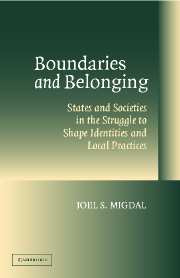 Boundaries and Belonging
Boundaries and Belonging Book contents
- Frontmatter
- Contents
- List of Contributors
- Preface and Acknowledgments
- PART I INTRODUCTION
- PART II ON THE EVE OF THE NATION-STATE: THE OTTOMAN EMPIRE
- PART III THE STATE AND “DANGEROUS POPULATIONS”
- 4 “Dangerous Populations”: State Territoriality and the Constitution of National Minorities
- 5 Making Myanmars: Language, Territory, and Belonging in Post-Socialist Burma
- 6 Institutionalizing Virtual Kurdistan West: Transnational Networks and Ethnic Contention in International Affairs
- PART IV INSCRIBING MEMBERSHIP AND CONTESTING MEMBERSHIP IN THE NATION
- PART V BEYOND THE STATE: TRANSNATIONAL FORCES AND THE CHALLENGE TO THE STATE
- PART VI CONCLUSION
- Index
6 - Institutionalizing Virtual Kurdistan West: Transnational Networks and Ethnic Contention in International Affairs
Published online by Cambridge University Press: 25 July 2009
- Frontmatter
- Contents
- List of Contributors
- Preface and Acknowledgments
- PART I INTRODUCTION
- PART II ON THE EVE OF THE NATION-STATE: THE OTTOMAN EMPIRE
- PART III THE STATE AND “DANGEROUS POPULATIONS”
- 4 “Dangerous Populations”: State Territoriality and the Constitution of National Minorities
- 5 Making Myanmars: Language, Territory, and Belonging in Post-Socialist Burma
- 6 Institutionalizing Virtual Kurdistan West: Transnational Networks and Ethnic Contention in International Affairs
- PART IV INSCRIBING MEMBERSHIP AND CONTESTING MEMBERSHIP IN THE NATION
- PART V BEYOND THE STATE: TRANSNATIONAL FORCES AND THE CHALLENGE TO THE STATE
- PART VI CONCLUSION
- Index
Summary
[T]he Kurdish problem is no longer an exotic affair of a people living at the other end of the world. It is largely perceived as a European problem – to such an extent that the German Foreign Minister, on a visit to Ankara, had to reply to his Turkish interlocutors that, even if, as they claimed, there was no Kurdish problem in Turkey, there was a major Kurdish problem in Germany!
Kendal Nezan, President, Institut Kurde de Paris, April 17, 2000Introduction
On a cold day in mid-February of 1999, staff at the Kurdish Institute in Paris arrived at work to find journalists knocking on their doors and their normally quiet offices flooded with phone calls, urgent faxes, and e-mail. Kurdish guerrilla leader Abdullah Öcalan had been captured by the Turks in faraway Kenya, and the reporters all needed the same thing: the Kurdish Reaction. “They all came here – TV cameramen and reporters from Europe, and around the world,” remembered one Institute representative. “They saw us as the voice for the Kurds.”
Not simply a solitary group, the Kurdish Institute in Paris sits at the heart of a transnational web of organizations and individuals dedicated to the promotion of Kurdish identity and rights. While Kurds struggled to maintain explicitly Kurdish representation in the public sphere within Turkey, by the late 1990s “pro-Kurdish” activists working in Turkey, Europe, and across national borders had produced a new phase of transnational contention that had critically altered the terms of negotiation between Turkish officials and Kurdish activists.
- Type
- Chapter
- Information
- Boundaries and BelongingStates and Societies in the Struggle to Shape Identities and Local Practices, pp. 121 - 148Publisher: Cambridge University PressPrint publication year: 2004
- 15
- Cited by


